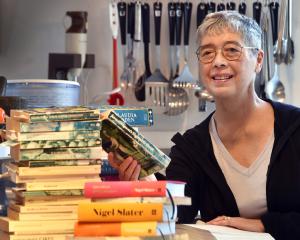

Dr Andrew Reynolds and Prof Jim Mann, of the University of Otago’s department of medicine, are working on the Healthy Food for your Heart Study to see if delivering free groceries high in fibre or high in healthy fats will make a difference to people who are recovering from a heart attack.
It is a big, expensive study, especially delivering groceries to 200 of the 300 participants for 12 weeks. It was funded by the Riddet Institute, a national centre of research excellence, and multiple other organisations, Dr Reynolds said.
Healthy mono and polyunsaturated fats have been promoted for heart health for some time but a strong focus on high fibre is more recent.
"One of the risk factors for a heart attack is a high saturated fat intake, and a way to reduce that is to replace things like butter with canola oil in cooking, shifting the ratio away from saturated fats to polyunsaturated. That’s easy, it’s a direct mechanism," he said.
A high-fibre diet was more satiating so people were more likely to eat less, which could mean less saturated fat intake as well as weight reduction, which was beneficial.

He and Prof Mann have already researched the benefits of fibre in heart disease management and a paper is expected to be published shortly.
"In the long term it will be interesting to see if delivering groceries to people recovering from a heart attack is cheaper than having to pay for the hospitalisation and care of a second cardiac event," he said.
He also expects many other benefits from the supply of free groceries.
He and his team are recruiting 300 people from Otago, Southland and Canterbury who have had a heart attack, a coronary artery bypass or a stent insertion in the past six months, and dividing them into three groups of 100 each.
The control group gets the usual care, which includes advice on heart healthy eating — foods high in healthy fats and foods high in fibre — as well as medical care and medicine. The Heart Foundation’s "Cheap Eats" booklet is a major source of dietary information and recipes.
The other two groups also receive the same care but in addition have a bag of groceries delivered each week for 12 weeks.
One group receives a bag of food high in healthy fats, such as nuts, seeds, olive oil, avocado, peanut butter, spread, eggs, canned tuna and salmon.
The other group receives high-fibre food, such as multigrain bread, wholegrain flour, oats, brown rice, cans of legumes, such as beans and lentils, and high-fibre vegetables and fruit.
"Our idea is to deliver 14 foods each week to their door. It’s a really large amount so they can share it with their family."
Participants are checked at the start and at the end of the deliveries, another 12 weeks after that and a year later to see if they have had a second coronary event or had to access health services or change their medication and whether they have continued eating healthily.
"We are interested in the participants’ blood data, which will tell us if they are at risk of a secondary event or whether it’s good for their blood sugar control if they have diabetes, because people who have heart attacks often also have type 2 diabetes," he said.
"We are also interested in how it changes the microbiota — gut health is important. We know that high-fibre foods are good for the gut but we don’t know how the microbiota will change over the 12 weeks when compared with the foods high in healthy fats," he said.
"We also have qualitative angles about how people felt — were there any new groceries in those boxes? Did they start to eat more of them over time as they were continually delivered to their door? Did their whanau and their family eat them? Did they find them easy to incorporate into their diet? What were the challenges?
"The qualitative angle should capture the family perspectives. We are also looking at wellbeing scores, body weight, body fat percentage, and grocery costs."
Interestingly, the healthy fat foods were not the basis of a meal — you don’t start with almonds or oil and make a meal, he said.
"Whereas with the high-fibre foods you can start with legumes, bread, rice or vegetables as the basis of your meal, so I’m really interested to see if providing these groceries to people is actually saving them money or if they still have to buy food for meals they are used to."
The trial is still in progress but some early comments from participants included their unfamiliarity with legumes — many people had not seen beans except baked beans before.
"Some related the legumes to greater flatulence, but that should pass as people’s digestive systems and their microbiota adapt. The main negative comment so far is that people want to try more new foods than the 14 we deliver each week! Some participants have reported enjoying experimenting with the new foods and what they can do with them. We think that’s great!"
Dr Reynolds whichever way the results turned out there would be a winner.
If one of the food groups had better outcomes than the control group there would be an obvious winner. If both did, the high-fibre foods at half the cost of the healthy fat groceries would be preferred.
"If neither proves better than the control group, that means usual care with pharmacological and dietary advice is sufficient to support these people in the months after a heart attack, and that is also really good news. That will mean we are doing the right thing now. It’s win win win," Dr Reynolds said.
- For more information visit : www.otago.ac.nz/dsm-medicine/research/otago744417.html













